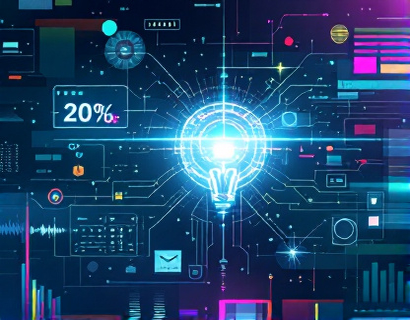Crypto AI Synergy: Elevating Digital Transformation with Advanced Tech Solutions
The intersection of cryptocurrency and artificial intelligence (AI) is giving birth to a new era of digital transformation. This synergy is not just a technological curiosity but a powerful force driving innovation across various industries. As tech enthusiasts and early adopters, understanding this convergence is crucial for anyone looking to stay ahead in the rapidly evolving digital landscape.
The integration of cryptocurrency and AI is creating advanced tech solutions that are redefining how we interact with digital systems. These solutions are not only enhancing efficiency and security but also opening up new possibilities for decentralized applications and smart contracts. This article delves into the key areas where crypto AI synergy is making a significant impact, providing a comprehensive look at the future of technology.
Enhanced Security through Cryptographic Techniques
One of the most immediate benefits of combining cryptocurrency and AI is the enhancement of security measures. Traditional systems often rely on centralized databases, making them vulnerable to cyber attacks. By leveraging blockchain technology, which is the backbone of cryptocurrencies, data is distributed across a network of nodes, reducing the risk of a single point of failure.
AI algorithms can further bolster security by detecting and mitigating threats in real-time. Machine learning models can analyze patterns and anomalies in transaction data, identifying potential fraud or malicious activities before they cause significant damage. For instance, AI-powered systems can monitor blockchain transactions and flag suspicious behavior, such as unusual transaction volumes or patterns that deviate from the norm.
Moreover, AI can improve the security of private keys and wallet management. Traditional methods of storing private keys, such as hardware wallets, can be compromised through various means. AI-driven solutions can enhance key management by using advanced encryption techniques and biometric authentication, ensuring that only authorized users can access sensitive information.
Optimized Smart Contracts with AI
Smart contracts are self-executing contracts with the terms of the agreement directly written into code. They automate and enforce contractual obligations without the need for intermediaries. However, the complexity of smart contracts can lead to vulnerabilities and errors. AI can play a pivotal role in optimizing and securing these contracts.
AI algorithms can analyze smart contract code to identify potential vulnerabilities and suggest improvements. By using natural language processing (NLP), AI can understand and interpret the intent behind the code, ensuring that the contract functions as intended. This not only reduces the risk of bugs and exploits but also streamlines the development process, making it more efficient and cost-effective.
Additionally, AI can optimize the execution of smart contracts by predicting and adapting to changing conditions. For example, in decentralized finance (DeFi) applications, AI can dynamically adjust parameters based on market conditions, ensuring that contracts remain fair and effective. This level of adaptability is crucial for the widespread adoption of smart contracts in various industries.
Decentralized Data Marketplaces
The convergence of cryptocurrency and AI is also revolutionizing data management and monetization. Traditional data markets are centralized, with a few large players controlling access to vast amounts of data. This centralization raises concerns about privacy, data ownership, and equitable distribution of benefits.
Decentralized data marketplaces, powered by blockchain and AI, offer a more transparent and equitable solution. These platforms allow data producers to sell their data directly to consumers, ensuring that they receive fair compensation. AI algorithms can facilitate the matching process, matching data suppliers with buyers based on relevance, quality, and demand.
Cryptocurrency ensures that transactions are secure and transparent, with every exchange recorded on the blockchain. This transparency builds trust among participants and reduces the risk of fraud. Moreover, AI can enhance the value of data by providing insights and analytics, transforming raw data into actionable intelligence. This synergy not only empowers data producers but also drives innovation in data-driven industries such as healthcare, finance, and marketing.
AI-Driven Cryptocurrency Trading Platforms
The trading of cryptocurrencies has become increasingly popular, but the volatility and complexity of the market can be daunting for newcomers. AI-driven trading platforms are addressing these challenges by providing sophisticated tools and insights to traders.
These platforms use machine learning algorithms to analyze market data, identify trends, and make predictive forecasts. Traders can benefit from automated trading bots that execute trades based on predefined strategies, reducing the need for constant monitoring and manual intervention. AI can also help in risk management by setting stop-loss orders and adjusting positions in real-time to mitigate potential losses.
Furthermore, AI can personalize the trading experience by understanding individual trader preferences and behavior. By analyzing historical trades and market conditions, AI can recommend tailored strategies and provide educational content to help traders improve their skills. This level of personalization is crucial for democratizing access to cryptocurrency trading and fostering a more inclusive community.
Enhancing User Experience through AI-Powered Interfaces
The user experience (UX) of cryptocurrency and blockchain applications is critical for adoption and retention. AI can significantly enhance UX by providing intuitive and personalized interfaces. Natural language interfaces, powered by AI, allow users to interact with applications using natural language commands, making the technology more accessible to non-technical users.
AI-driven chatbots and virtual assistants can provide real-time support and guidance, answering common questions and assisting users with complex tasks. These AI-powered interfaces can adapt to user preferences and behavior, offering a more seamless and efficient experience. For example, a virtual assistant can guide a user through the process of setting up a wallet, transferring funds, or executing a smart contract, reducing the learning curve and increasing user satisfaction.
Additionally, AI can optimize the design of user interfaces by analyzing user interactions and feedback. Machine learning algorithms can identify usability issues and suggest improvements, ensuring that applications are user-friendly and intuitive. This continuous optimization process helps in maintaining a high level of user engagement and loyalty.
Decentralized Identity Management
Identity management is a critical aspect of digital interactions, and the convergence of cryptocurrency and AI is transforming how identities are managed and verified. Traditional identity systems are often centralized and vulnerable to breaches, leading to privacy concerns and identity theft.
Decentralized identity solutions, powered by blockchain and AI, offer a more secure and privacy-focused approach. Users can control their identity data and decide who has access to it. AI algorithms can verify identities through biometric data, such as facial recognition or fingerprint scans, ensuring that only authorized individuals can access sensitive information.
These decentralized identity systems can also facilitate cross-platform authentication, eliminating the need for multiple login credentials. Users can use a single identity to access various services and applications, streamlining the user experience and enhancing security. The use of cryptocurrencies in this context ensures that transactions related to identity verification are secure and transparent, building trust among users.
Challenges and Considerations
While the synergy between cryptocurrency and AI holds immense potential, there are several challenges and considerations that need to be addressed. One of the primary concerns is regulatory compliance. The rapidly evolving nature of both technologies makes it challenging to navigate the regulatory landscape, which varies significantly across different jurisdictions.
Another challenge is the technical complexity involved in integrating these technologies. Developers need to possess a deep understanding of both blockchain and AI to create robust and secure solutions. This requires a skilled workforce and significant investment in research and development.
Moreover, there are ethical considerations to keep in mind. The use of AI in decision-making processes must be transparent and fair, avoiding biases that could lead to discriminatory outcomes. Ensuring that AI systems are accountable and explainable is crucial for building trust and acceptance among users.
Conclusion
The convergence of cryptocurrency and AI is ushering in a new era of digital transformation, offering innovative solutions that enhance security, efficiency, and user experience. From secure smart contracts to decentralized data marketplaces and AI-driven trading platforms, the potential applications are vast and varied. As tech enthusiasts and early adopters, embracing this synergy is essential for staying ahead in the digital landscape.
While challenges exist, the benefits of this convergence are undeniable. By fostering a collaborative and inclusive approach, we can harness the power of crypto AI synergy to drive meaningful change and innovation. The future of technology is bright, and those who embrace this synergy will be at the forefront of shaping it.










































